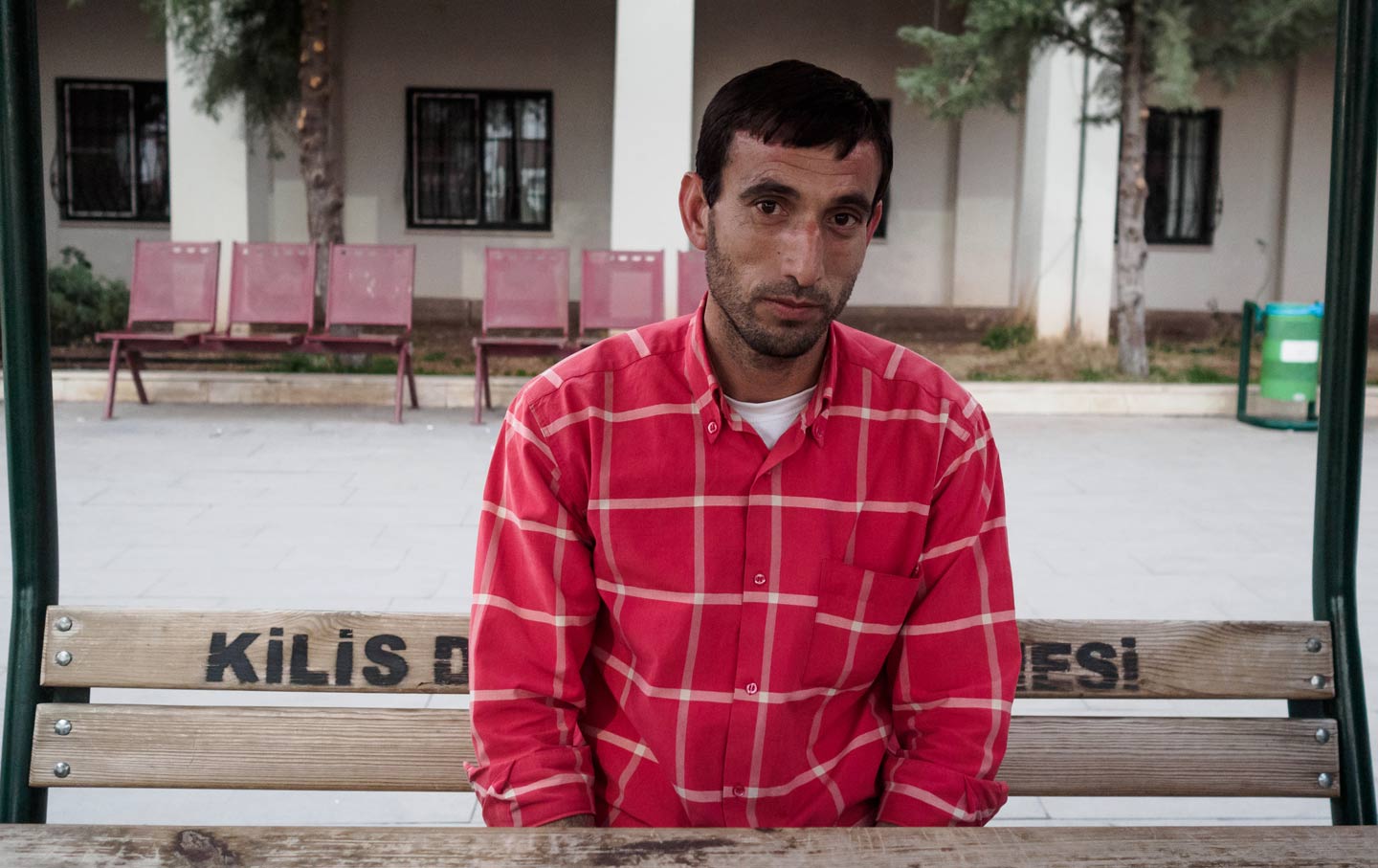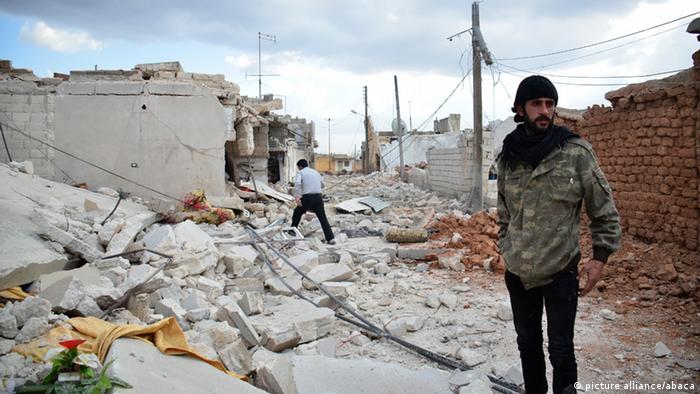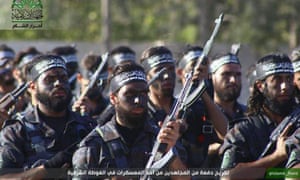
'I’d like to point out that many of the soldiers and officers who left Assad’s army did it for moral and ideological reasons. They did so in an effort to put an end to the injustice, havoc, and murders in Syria rather than because of hunger or lack of money. These officers swore an oath of allegiance to their fellow countrymen and remained true to that oath, taking the side of the Syrian revolution.
When Assad’s army started to crumble, Assad had to form the so-called Shabiha squads. Shabiha were not proper military; they were armed gangs killing Syrians. When Shabiha could no longer hold back the Syrian revolution, the Assad regime invited mercenaries from abroad. First, they invited Lebanese Hezbollah; later, they brought Iraqi brigades and invited Qasem Suleimani with the Iranian Army of the Guardians of the Islamic Revolution (IRGC) and the Failak Al Quds corps. They also released and trained convicts from Tehran’s jails to send them as mercenaries to Syria. That was how control over the military passed from Bashar Assad into Iran’s hands, with Qasem Suleimani becoming Syria’s supreme warlord.
But even after the Hezbollah and Iranian-Iraqi incursion, Assad continued to lose ground, having to seek the backing of the Russian air force to continue the extermination of the Syrian people. Today, Russian warplanes bomb Syrian civilians under the pretext of combating ISIS. Over 95% of all air strikes are made against Syrian civilians and the Free Syrian Army (FSA).
Assad’s regular army is history now. Let’s count foreign mercenaries. Hezbollah: 15 to 20 thousand fighters from Lebanon.
Iraqi mercenaries: the al-Nujaba militia, Abu Fadl Al-Abbas, and others (approximately 36 Iraqi brigades), 20 to 30 thousand men, all Shiites.
Iran sent IRGC’s advisors Failak Al Quds: the so-called “army of volunteers” who “volunteered” to fight in Syria. Iran also sent Afghani convicts and junkies. All in all, 20 to 30 thousand people.
There are also mercenaries from Chechnya, Afghanistan, India and Pakistan. 3 more thousand people have been recently brought from Nigeria.
All in all, there are about 100 thousand people fighting for Assad. This is not counting the Russian troops.
On 12 February, we captured 3 towns in the Turkmen Mountain area; the week before, we recaptured 7 villages near Aleppo. None of it was mentioned in the media. Not a word will ever be said about Russian casualties or Hezbollah fighting in Aleppo. That is, the Russian media deliberately and consistently misinform both their fellow citizens and the whole international community.
As soon as Russian air strikes end, we will take back all the areas seized by the regime’s fighters under the cover of the Russian air force. Assad’s mercenaries can move forward with the backing of the Russian aerospace forces only; they cannot retain those areas on their own.
We do not have anti-aircraft missiles at the moment, and we did not have them previously. From the beginning of war, the Assad regime has moved all air defense systems to the main bases, since the FSA does not have airplanes, and so that the systems did not end up in the hands of rebels.
The information about supply of air defense systems to the rebels is not true; we are not receiving these from any sources, because the US has imposed an embargo on such supplies from the very beginning of the revolution. From the start of uprising, everyone knows the ‘3 no’s’ of American ambassador to Syria, Robert Ford: ‘no weapons supplies, no no-fly zone, and no military intervention’, and each of these 3 ‘no’s’ is in force at present time. Air defense systems are lethal weapons. Syrian revolution will obtain no such support.
IS, a terrorist organization, was developed by Assad guards, together with Russia, Iran, Iraq and some of western special service agencies. Russia subsidizes IS. IS does not fight against the regime, but against the FSA that has liberated the coast from IS, to the south of Aleppo and in Idlib. Now IS is located in the north-east of Aleppo. However, Russian jets do not strike IS. The question is why? IS has a line of contact with the regime troops, while Shia groups fight only against FSA. Why do they not fight against IS? They have a line of contact stretching 70 km, so what is the secret?
These rhetorical questions demonstrate explicit cooperation between the regime and IS: they were provided large strategic warehouses in Palmira, their convoy, 3 km in length, travelled from Raqqa to Palmira in the open desert. Why was it not hit by an airstrike? They were given warehouses, 17-th division and an airbase in Tabqa. That is because both Assad and Russia realize that a demise of IS will lead to the fall of Assad regime. Why Russia is so opposed to the involvement of the Saudi and Turkish troops to fight IS? The reason is that IS serves as an excuse for the Russian intervention in Syria. Kremlin did not spend a single day or moment to fight IS.
Definitely, the presence of Russia in Syria is a type of occupation. The actual military situation makes it clear that discontinuing Russian intervention would mean inevitable fall of the regime. For this reason, the regime is doing everything possible to please Russia. Introducing Russian music and language, Putin is enticing Russian businessmen to invest in Syrian coastal territories. These things are happening as part of the agreement between Assad and Russia, it is a degrading and enslaving type of agreement.
There is unspoken agreement between representatives of the EU and the US on the matter, to not allow the unification of allied rebel forces, because the US has interest in continuing the war in order to weaken Hezbollah, Iran and Russia in Syria. Thus, any unification of all groups within a strong army would mean ruining these plans. Americans are playing their own game with their narrative about the disparity of rebel forces. In 2013 I visited Europe, meeting with politicians and explaining how their support in development of strong armed forces to fight Assad would guarantee the fall of his regime in half a year. We argued that their support in building up of a national army capable of wiping out the Assad regime over the 6 months, would be incomparable to their future losses, when Europe is faced with millions of refugees coming from Syria. Europeans agreed with our view, but the US blocked the creation of the armed forces.
Fighting in the coastal area had a purpose to establish borders of the Alawite state; fighting on the northeastern side of Aleppo – for the Kurdish state; and the remaining territory, from Iraq to Idlib, is meant for the Sunni state. The international community may not agree with this approach, yet Russia aims to dictate conditions for keeping Assad in power – through the use of military forces, killing of civilians, destruction of infrastructure (8 hospitals, 25 schools, 20 humanitarian agencies) and bombings of refugees at the Turkish border. People of Syria will never accept this. Even if the whole country is occupied, there will be guerrilla resistance.
There are 300,000 troops that will not allow neither Russians, nor Iranians, and especially Assad to stay on Syrian land. The international community is working to find a compromise, while Russia wants to grab the greatest share and assert control over our territory. Russia makes plans for a role in the future of Syria. Our country will have no military or economic relations with Russia.
People of Syria view the Russian government as war criminals that utilize all types of means and weapons to fight against Syrian people. People of Syria will not forgive Putin for the mess he has created. There is one solution and that is the departure of Assad. In case the international community is not able to find political means to remove the Assad regime from power, then support should be provided to people of Syria in order to take down the regime. One way or another, the revolution will continue until it achieves its victory.'




